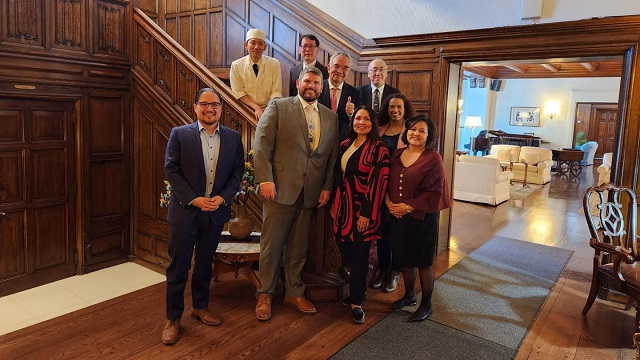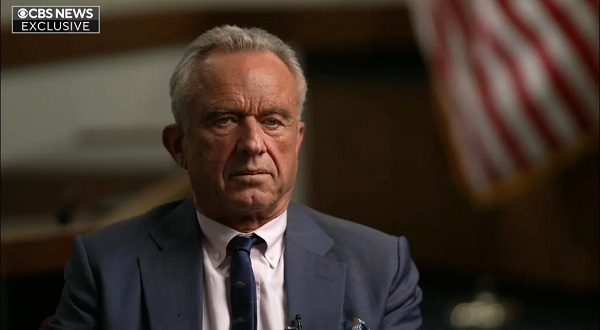Alberta
Indigenous-owned LNG projects in jeopardy with proposed emissions cap, leaders warn

Indigenous leaders meet with Japan’s ambassador to Canada Kanji Yamanouchi. Photo courtesy Energy for a Secure Future
From the Canadian Energy Centre
By Cody Ciona
‘It’s like we’re finally at the table and we’re having to fight to keep our seat at the table’
A proposed cap on oil and gas emissions will threaten opportunities for Indigenous communities to bring cleaner alternatives to coal to international markets, Indigenous leaders warned during a recent webinar.
Karen Ogen, CEO of the First Nations LNG Alliance, fears Indigenous-led projects like Cedar LNG and Ksi Lisims LNG are threatened by the cap, which is essentially a cap on production.
“If we’re going to help China and India get off of coal and help reduce their greenhouse gas emissions, it makes common sense for us to be selling our LNG to Asia and to other countries. To put a cap on, it would just stop us from doing that,” Ogen said.
“It’s like we’re finally at the table and we’re having to fight to keep our seat at the table.”
Indigenous communities across Canada have increasingly become involved in oil and gas projects to secure economic prosperity and reduce on-reserve poverty.
Since 2022, more than 75 First Nations and Metis communities have entered ownership agreements across western Canada. Among those are key projects like the Coastal GasLink pipeline and the joint investment of 23 communities to obtain a 12 per cent ownership stake in several oil sands pipelines.
The planned federal emissions cap will stall progress toward economic reconciliation, Ogen said.
“Our leaders did not accept this and fought hard to have rights and titles recognized,” she said.
“These rights were won through persistence and determination. It’s been a long journey, but we are finally at the table with more control over our destiny.”
Chris Sankey, CEO of Blackfish Enterprises and a former elected councillor for the Lax Kw’alaams Band in B.C., said the proposed emissions cap could stifle Indigenous communities pushing for poverty reduction.
“We’re working hard to try to get our people out of poverty. All [the emissions cap is] doing is pushing them further into debt and further into poverty,” he said.
“When oil and gas is doing well, our people do well.”
Together, the Trans Mountain Pipeline Expansion, LNG Canada project and Coastal GasLink pipeline have spent more than $10 billion in contracts with Indigenous and local businesses
Indigenous employment in the oil and gas industry has also increased by more than 20 per cent since 2014.
For Stephen Buffalo, CEO of the Indian Resource Council, an emissions cap feels like a step in the wrong direction after years of action to become true economic partners is finally making headway.
“Being a participant in the natural resource sector and making true partnerships, has been beneficial for First Nations,” he said.
“So, when you see a government trying to attack this industry in that regard, it is very disheartening.”
Alberta
Alberta takes big step towards shorter wait times and higher quality health care

From the Fraser Institute
On Monday, the Smith government announced that beginning next year it will change the way it funds surgeries in Alberta. This is a big step towards unlocking the ability of Alberta’s health-care system to provide more, better and faster services for the same or possibly fewer dollars.
To understand the significance of this change, you must understand the consequences of the current (and outdated) approach.
Currently, the Alberta government pays a lump sum of money to hospitals each year. Consequently, hospitals perceive patients as a drain on their budgets. From the hospital’s perspective, there’s little financial incentive to serve more patients, operate more efficiently and provide superior quality services.
Consider what would happen if your local grocery store received a giant bag of money each year to feed people. The number of items would quickly decline to whatever was most convenient for the store to provide. (Have a favourite cereal? Too bad.) Store hours would become less convenient for customers, alongside a general decline in overall service. This type of grocery store, like an Alberta hospital, is actually financially better off (that is, it saves money) if you go elsewhere.
The Smith government plans to flip this entire system on its head, to the benefit of patients and taxpayers. Instead of handing out bags of money each year to providers, the new system—known as “activity-based funding”—will pay health-care providers for each patient they treat, based on the patient’s particular condition and important factors that may add complexity or cost to their care.
This turns patients from a drain on budgets into a source of additional revenue. The result, as has been demonstrated in other universal health-care systems worldwide, is more services delivered using existing health-care infrastructure, lower wait times, improved quality of care, improved access to medical technologies, and less waste.
In other words, Albertans will receive far better value from their health-care system, which is currently among the most expensive in the world. And relief can’t come soon enough—for example, last year in Alberta the median wait time for orthopedic surgeries including hip and knee replacements was 66.8 weeks.
The naysayers argue this approach will undermine the province’s universal system and hurt patients. But by allowing a spectrum of providers to compete for the delivery of quality care, Alberta will follow the lead of other more successful universal health-care systems in countries such as Australia, Germany, the Netherlands and Switzerland and create greater accountability for hospitals and other health-care providers. Taxpayers will get a much better picture of what they’re paying for and how much they pay.
Again, Alberta is not exploring an untested policy. Almost every other developed country with universal health care uses some form of “activity-based funding” for hospital and surgical care. And remember, we already spend more on health care than our counterparts in nearly all of these countries yet endure longer wait times and poorer access to services generally, in part because of how we pay for surgical care.
While the devil is always in the details, and while it’s still possible for the Alberta government to get this wrong, Monday’s announcement is a big step in the right direction. A funding model that puts patients first will get Albertans more of the high-quality health care they already pay for in a timelier fashion. And provide to other provinces an example of bold health-care reform.
Alberta
Alberta’s embrace of activity-based funding is great news for patients

 From the Montreal Economic Institute
From the Montreal Economic Institute
Alberta’s move to fund acute care services through activity-based funding follows best practices internationally, points out an MEI researcher following an announcement made by Premier Danielle Smith earlier today.
“For too long, the way hospitals were funded in Alberta incentivized treating fewer patients, contributing to our long wait times,” explains Krystle Wittevrongel, director of research at the MEI. “International experience has shown that, with the proper funding models in place, health systems become more efficient to the benefit of patients.”
Currently, Alberta’s hospitals are financed under a system called “global budgeting.” This involves allocating a pre-set amount of funding to pay for a specific number of services based on previous years’ budgets.
Under the government’s newly proposed funding system, hospitals receive a fixed payment for each treatment delivered.
An Economic Note published by the MEI last year showed that Quebec’s gradual adoption of activity-based funding led to higher productivity and lower costs in the province’s health system.
Notably, the province observed that the per-procedure cost of MRIs fell by four per cent as the number of procedures performed increased by 22 per cent.
In the radiology and oncology sector, it observed productivity increases of 26 per cent while procedure costs decreased by seven per cent.
“Being able to perform more surgeries, at lower costs, and within shorter timelines is exactly what Alberta’s patients need, and Premier Smith understands that,” continued Mrs. Wittevrongel. “Today’s announcement is a good first step, and we look forward to seeing a successful roll-out once appropriate funding levels per procedure are set.”
The governments expects to roll-out this new funding model for select procedures starting in 2026.
* * *
The MEI is an independent public policy think tank with offices in Montreal, Ottawa, and Calgary. Through its publications, media appearances, and advisory services to policymakers, the MEI stimulates public policy debate and reforms based on sound economics and entrepreneurship.
-

 2025 Federal Election2 days ago
2025 Federal Election2 days agoResearchers Link China’s Intelligence and Elite Influence Arms to B.C. Government, Liberal Party, and Trudeau-Appointed Senator
-

 Business2 days ago
Business2 days agoTimeline: Panama Canal Politics, Policy, and Tensions
-

 COVID-192 days ago
COVID-192 days agoFauci, top COVID officials have criminal referral requests filed against them in 7 states
-

 2025 Federal Election2 days ago
2025 Federal Election2 days agoPoilievre Announces Plan To Cut Taxes By $100,000 Per Home
-

 Health2 days ago
Health2 days agoRed Deer Hospital Lottery – Previous Supporter Draw Deadline!
-

 Health2 days ago
Health2 days agoRFK Jr. Shuts Down Measles Scare in His First Network Interview as HHS Secretary
-

 Bjorn Lomborg2 days ago
Bjorn Lomborg2 days agoThe stupidity of Net Zero | Bjorn Lomborg on how climate alarmism leads to economic crisis
-

 International2 days ago
International2 days agoTrump White House will ignore reporter emails that include ‘preferred pronouns’ in signature






